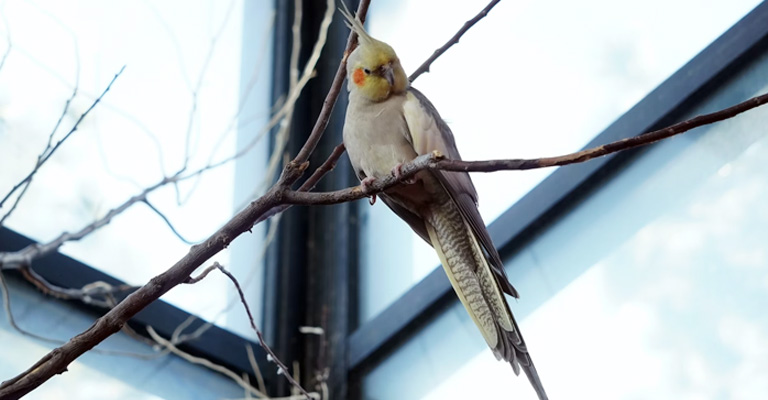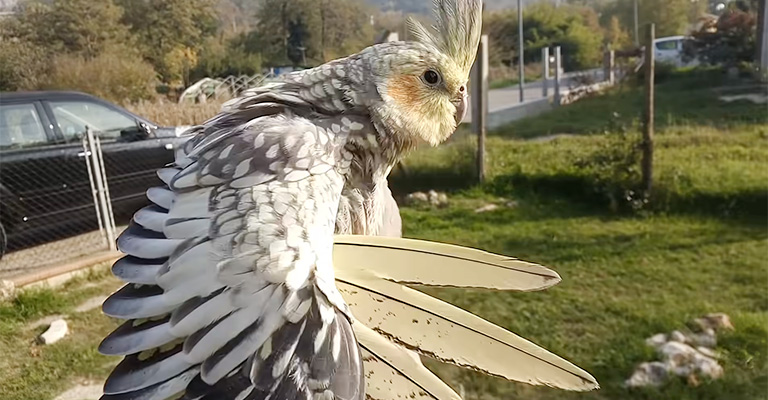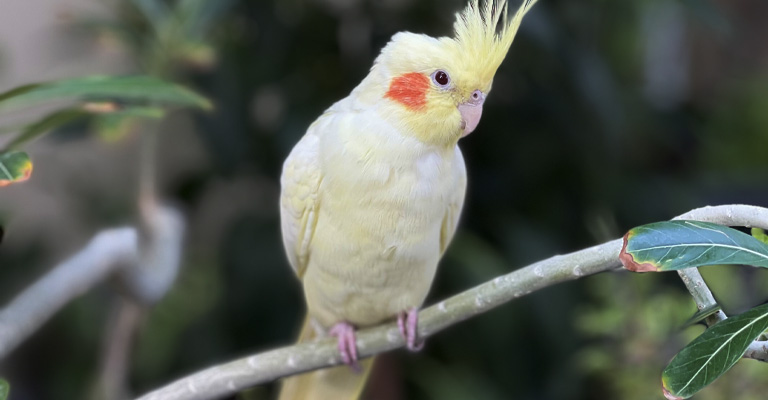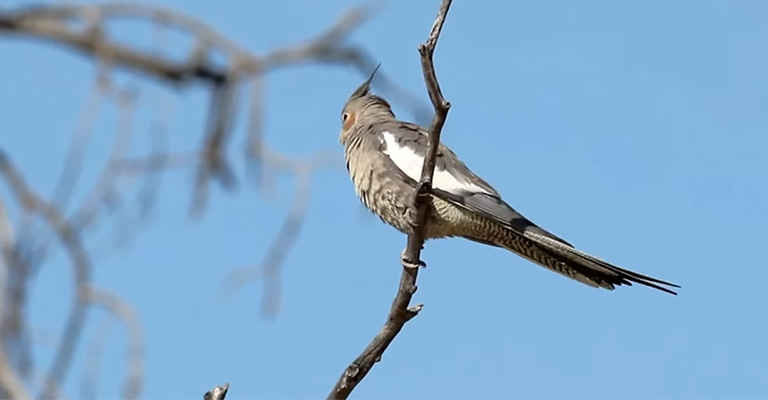Losing a beloved pet can be a distressing experience, especially when it’s a cockatiel that has flown away. These charming and intelligent birds are known for their playful nature and strong bond with their owners.
However, accidents happen, and sometimes they manage to escape their cages or fly away during outdoor excursions. If you find yourself in this unfortunate situation, it’s natural to wonder if your cockatiel will ever return.
So, when your cockatiel flew away: will it come back? What to do?
In this article, we will explore the possibilities of your cockatiel coming back, provide guidance on what to do in such circumstances, and offer tips to help you navigate this challenging situation.
While every situation is unique, understanding the behavior of cockatiels and implementing appropriate strategies can greatly improve the likelihood of a happy reunion with your feathered friend.

Cockatiel Flew Away: Will It Come Back? What to Do?
While there is no guarantee that a lost cockatiel will return, several factors can influence the chances of its homecoming. Species characteristics, distance and time, environmental factors, bond with the owner, search efforts, and training/socialization all play a role.
In this discussion, we will explore the various factors that can influence the likelihood of your cockatiel coming back.
Species Characteristics
Cockatiels are known for their strong homing instincts. They are generally loyal to their owners and may attempt to return home if they are familiar with their surroundings.
However, individual cockatiels may vary in their ability to navigate and find their way back.
Distance and Time
The distance your cockatiel has flown and the time it has been missing are crucial factors. If your cockatiel has flown a significant distance, it may struggle to find its way back.
Additionally, the longer it has been missing, the more challenging it becomes for the bird to return home.
Environmental Factors
The environment in which your cockatiel flew away plays a significant role. Factors such as weather conditions, availability of food and water, presence of predators, and the overall safety of the area can influence the bird’s chances of survival and return.
Bond with the Owner
The strength of the bond between the cockatiel and its owner can impact the bird’s motivation to return.
If the bird has a close relationship with its owner, it may be more inclined to find its way back home. Regular interaction, positive reinforcement, and a sense of security can strengthen this bond.
Search Efforts

The actions you take immediately after your cockatiel flies away can greatly affect the chances of its return.
Promptly searching the area, putting up flyers, contacting local bird rescue organizations, and spreading the word within the community can increase the likelihood of someone spotting and reporting the bird’s whereabouts.
Training and Socialization
Cockatiels that have undergone training and socialization may have a better chance of returning. Birds that are familiar with recall commands or have been exposed to outdoor environments may be more likely to respond to their owner’s calls or recognize landmarks that guide them back home.
Previous Outdoor Experience
If your cockatiel has had previous experience being outdoors, such as supervised outdoor playtime or exposure to outdoor environments, it may have a better understanding of its surroundings and be more likely to navigate back home.
Vocalization and Distress Calls
Cockatiels are known for their vocalizations, and your bird may use its calls to communicate its location or distress.
If your cockatiel is vocalizing or making distress calls, it can attract attention from nearby individuals who may be able to help locate and return the bird.
Local Wildlife and Bird Population
The presence of other birds and wildlife in the area can impact your cockatiel’s behavior and chances of returning.
If there are other cockatiels or bird species in the vicinity, your bird may be more likely to seek their company or follow their lead, potentially increasing the chances of finding its way back home.
Human Interaction
The interactions your cockatiel has with humans after flying away can also influence its return.
If it encounters kind and caring individuals who provide food, water, or shelter, it may be more inclined to stay in the area or seek help from humans, increasing the chances of being reunited with its owner.
Microchipping and Leg Bands
If your cockatiel has been microchipped or has a leg band with identification information, it can significantly increase the chances of being identified and returned if found by someone else.
Ensure that your contact information is up to date with the microchip registry or leg band registration.
What to Do When Your Cockatiel Flew Away?

Losing a cockatiel can be a distressing experience, but there are several steps you can take when your cockatiel flies away:
Stay Calm
It’s natural to feel panicked and worried, but try to stay calm. Panicking can hinder your ability to think clearly and take appropriate actions.
Secure Your Home
Ensure that all doors, windows, and other potential escape routes are closed to prevent your cockatiel from re-entering your home while you search for it.
Search the Immediate Area
Start searching the area where your cockatiel was last seen. Look in nearby trees, bushes, rooftops, and any other potential hiding spots. Call out your cockatiel’s name and listen for any vocalizations or distress calls.
Inform Your Neighbors
Notify your neighbors about your missing cockatiel. Provide them with a description and ask them to keep an eye out for your bird. They may be able to provide valuable information if they spot your cockatiel.
Put Up Flyers
Create flyers with a clear photo of your cockatiel, its name, and your contact information. Include details about when and where it was last seen.
Distribute these flyers in your neighborhood, local pet stores, veterinary clinics, and community bulletin boards.
Contact Local Animal Shelters and Bird Rescue Organizations
Reach out to local animal shelters, bird rescue organizations, and veterinary clinics to report your missing cockatiel. Provide them with all the necessary details and ask them to keep an eye out for your bird.
Utilize Social Media
Share information about your missing cockatiel on social media platforms, local community groups, and bird-related forums. This can help spread the word and increase the chances of someone spotting and reporting your bird’s whereabouts.
Set Up a Temporary Feeding Station
Place a cage or a secure container with food, water, and familiar toys in your yard or the area where your cockatiel was last seen. The familiar items and the scent of food may attract your bird back to the area.
Use Vocalizations and Distress Calls
Continue calling out your cockatiel’s name and using familiar phrases or sounds that your bird recognizes. Cockatiels are known to respond to their owners’ voices, so keep trying to establish vocal contact.
Stay Persistent and Seek Help
Don’t give up your search. Keep looking for your cockatiel, and if necessary, seek assistance from professional bird trackers or avian experts who specialize in locating lost birds.
Remember, the sooner you take action and involve others in your search efforts, the better the chances of finding your cockatiel. Stay hopeful and continue your efforts until your beloved bird is safely back home.
Why Do Pet Cockatiels Fly Away?

Pet cockatiels may fly away for several reasons, including:
Instinctual Behavior
Cockatiels are naturally curious and have a strong instinct to explore their surroundings. Sometimes, their natural instincts can override their bond with their owners, leading them to fly away in search of new experiences or to satisfy their innate need for exploration.
Fear or Startle Response
Loud noises, sudden movements, or other perceived threats can startle cockatiels and trigger a fear response. In such situations, they may panic and take flight, unintentionally flying away from their familiar environment.
Open Doors or Windows
Cockatiels are quick and agile flyers, and if a door or window is left open, they may seize the opportunity to escape. It’s important to be cautious and ensure that all potential escape routes are secured when interacting with your pet cockatiel.
Lack of Supervision
Leaving a cockatiel unsupervised, especially in an unsecured or unfamiliar environment, increases the risk of it flying away. It’s crucial to provide a safe and supervised space for your bird to prevent accidental escapes.
Desire for Social Interaction
Cockatiels are social creatures and may fly away in search of companionship. If they feel lonely or lack social interaction, they may be motivated to explore and find other birds or humans to interact with.
Hormonal Changes
During breeding season, cockatiels may experience hormonal changes that can affect their behavior. They may become more restless, territorial, or prone to wander in search of a mate or nesting site.
Mistaken Identity
Sometimes, cockatiels may mistake other birds or objects for potential mates or companions. This can lead them to fly away in pursuit of what they perceive as a social connection.
FAQs
To prevent your cockatiel from flying away, ensure that its environment is secure by keeping doors and windows closed, using window screens, and supervising outdoor playtime. Provide plenty of mental and physical stimulation, and social interaction.
If your cockatiel flies away, stay calm and immediately start searching the area where it was last seen. Inform your neighbors, put up flyers, contact local animal shelters and bird rescue organizations, and utilize social media to spread the word.
The distance a cockatiel can fly if it escapes can vary depending on factors such as weather conditions, wind speed, and the bird’s physical condition.
While cockatiels are capable of flying long distances, they are more likely to stay within a few miles of their escape point.
There is a chance that your cockatiel may come back if it flies away, especially if it has a strong bond with you and is familiar with its surroundings. However, the likelihood of return depends on various factors such as distance, time, and environmental conditions.
The survival time of a cockatiel that flies away can vary depending on factors such as access to food, water, shelter, and the presence of predators. Cockatiels are resourceful birds and can survive for several days to weeks if they find suitable resources.
Final Words
Losing a cockatiel can be a heart-wrenching experience, but it’s important to remain hopeful and take proactive steps to increase the chances of their safe return.
Remember, cockatiels are resourceful and may find their way back home or seek help from kind-hearted individuals.
By spreading the word, utilizing social media platforms, and contacting local bird rescue organizations, you can create a network of support to aid in the search for your lost pet.
Additionally, setting up familiar items, such as their cage or favorite toys, in your yard can serve as a beacon to guide them back.
While the outcome may be uncertain, never underestimate the power of hope and determination. Stay positive, keep searching, and with a bit of luck, you may soon be reunited with your beloved cockatiel.